Our Howard Keel Centennial celebration begins. Here's Nathaniel R...
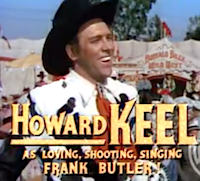 What is the lasting legacy of Hollywood's biggest musical of 1950, Annie Get Your Gun? The best remembered thing about it may well be its place in Judy Garland's storied career; she was infamously fired well into production, marking in some ways the nadir of her career, and fueling the mythology of that comeback of all comebacks with A Star is Born (1954) after a four year absence from the big screen. But that's not the movie as it exists today, only what could have been. And "could have beens" are many with this troubled production which lost its original star (Judy), its first two directors (Busby Berkeley and Charles Walters) and one key supporting cast member (Frank Morgan as Buffalo Bill, who died after filming began) on its way to its final cut.
What is the lasting legacy of Hollywood's biggest musical of 1950, Annie Get Your Gun? The best remembered thing about it may well be its place in Judy Garland's storied career; she was infamously fired well into production, marking in some ways the nadir of her career, and fueling the mythology of that comeback of all comebacks with A Star is Born (1954) after a four year absence from the big screen. But that's not the movie as it exists today, only what could have been. And "could have beens" are many with this troubled production which lost its original star (Judy), its first two directors (Busby Berkeley and Charles Walters) and one key supporting cast member (Frank Morgan as Buffalo Bill, who died after filming began) on its way to its final cut.
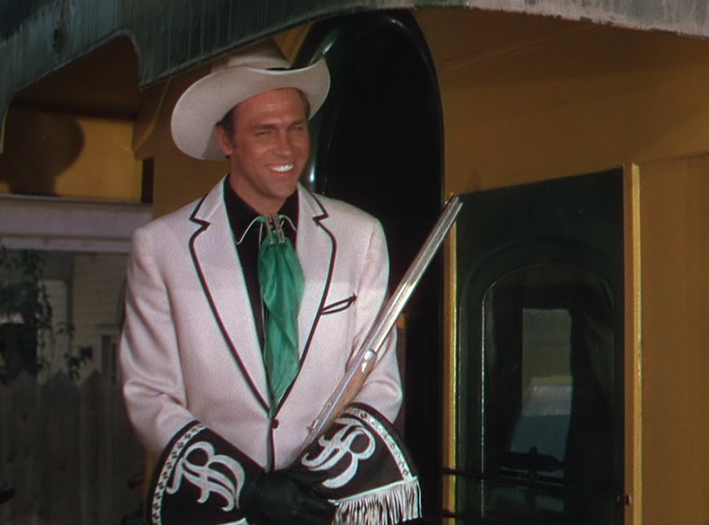 The first shot of Howard Keel in "Annie Get Your Gun"
The first shot of Howard Keel in "Annie Get Your Gun"
Though "Annie Get Your Gun" has had a long healthy life on stages, big and small (including three Broadway runs: 1946-1949, 1966, and 1999-2001) it's most lasting cinematic contribution is the introduction of Howard Keel as a leading man...
He was immediately a star after his Hollywood debut in Annie Get Your Gun but always second billed to the female star within this particular genre (with the exception of Kismet in 1955). His most direct comparison within the 1950s star system would surely be Gordon MacRae over at Warner Bros (Carousel, Oklahoma!, Tea For Two) though MacRae more often had top-billing. But a confession which you've probably guessed: Mostly, we're celebrating Howard Keel's centennial this week because we'll take any old excuses to watch musicals!
Keel had made a splash on Broadway in the late 1940s in Rodgers and Hammerstein musicals so he entered the movie industry buzzing and got a star's entrance on screen in Annie Get Your Gun's opening number. You're directed to watch him enter the frame, mid-song, and ladies in western finery swarm around to gawk at him.
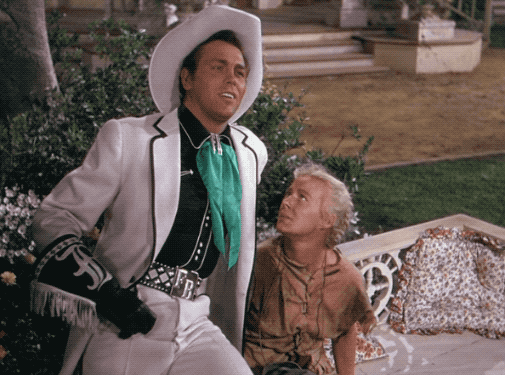
Ladies lusting after Keel will be a recurring gag throughout the movie, mostly as an offscreen plot point but onscreen by way of mugging Betty Hutton in the leading role, her jaw dropping multiple times when she's surprised to be looking.
He sure is purty."
This kind of relentless gawking at Keel, who was an attractive man but not a gobsmacking head-turner like a Kelly or a Brando, can strain credulity a bit. On the other hand his attractiveness, like his singing voice, is a worthy 1950s time capsule; he was definitely of the era, if not defining it. Barrel-chested, larger men (He was 6'3") with deep bass voices were definitely out of fashion within a decade or so's time in musicals (doesn't it seem like every leading male role is for tenors now?) and they even took a hit in non-musicals, too.
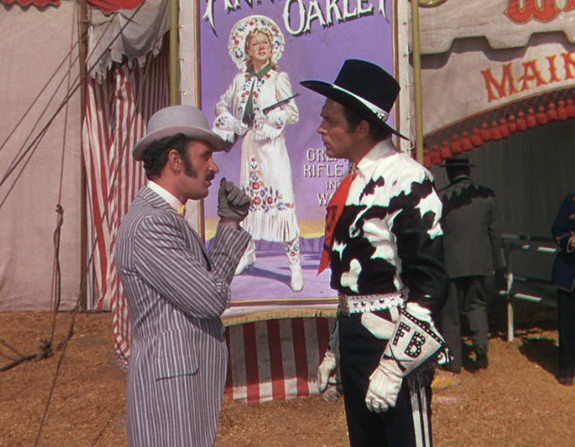 Frank is pissed that Annie gets a huge poster outside the tent
Frank is pissed that Annie gets a huge poster outside the tent
In the movie Frank Butler (Keel) and Annie Oakley (Betty Hutton) are at odds over who the better sharpshooter is. Butler has made his whole career at being a great marksman but Annie and the audience knows what's what: It's Annie who is the best in the world. But she's a country girl new to Showbiz. She vacillates between totally worshipping Butler and calling him a "swollen-headed stiff" and the plot is a kind of non-tragic Star is Born; her star rises and she feels overwhelmed by stardom, they fall madly in love, but his star does not fall nor does he drink too much. Frank merely gets his ego-bruised a bit before their mutual Happily Ever After.
Speaking of ego-bruising, one of the movie's (and Hutton's) best bits is when Oakley mocks Butler's posture, mannerisms, and emphatic singing style in her reprise of "The Girl I Will Marry".
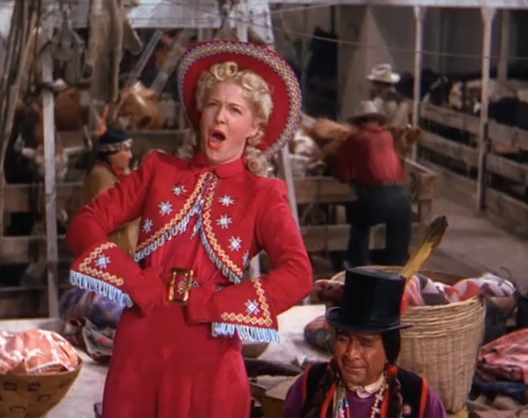
He sang me a love song. He just spit his heart right out at me.
If you know Howard Keel's career, this is pretty spot on (he wasn't exactly a character actor so Frank Butler is Howard Keel) Nevertheless, for essentially his first big onscreen role (he had made one picture in London before this) Keel acquits himself well, physically at ease in front of the camera and light on his feet with the comedy even if the acting never scratches below the surface, let alone digs. But that's okay given the BROAD material and that he's essentially the love-interest rather than the true star. Betty Hutton, oddly, struggles more. Hutton was a fine comic actress (see The Miracle of Morgan's Creek for proof) and she was Golden Globe nominated for this huge hit (in the top five grossers of its year) but let's just say the performance hasn't aged well. Either she wasn't directed at all by the third man in the director's chair, George Sidney, or the nerves got to her -- would you want to replace Judy Garland? (I mean...)
The problem essentially is that she vacillitates between Merman-esque playing to the very last row in a cavernous theater (which is, ahem, a lot when cameras are involved) and subtler more traditional movie star acting. She's trying out everything all throughout the picture as if she hasn't quite decided which tactic is going to work to sell this BUT SHE WILL SELL THIS. Hutton has moments of inspiration earning big laughs with some of her physical comedy but it's just turned up to eleven even when it needs to be at a three in some quieter scenes. Keel has it easier. He disappears for a good long stretch and, freed of the need to carry the picture, glides back into it so smoothly in a tux that you're thrilled to see him again.
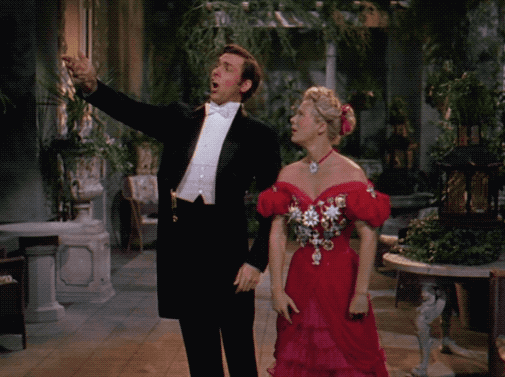
He returns just in time for the film's best number "Anything You Can Do (I Can Do Better)." Hutton and Keel famously did not get along on the picture, both accusing the other of trying to steal it. No wonder they both excel at the classic musical comedy duet that requires that their characters do just that.
Next: Calamity Jane (1953)